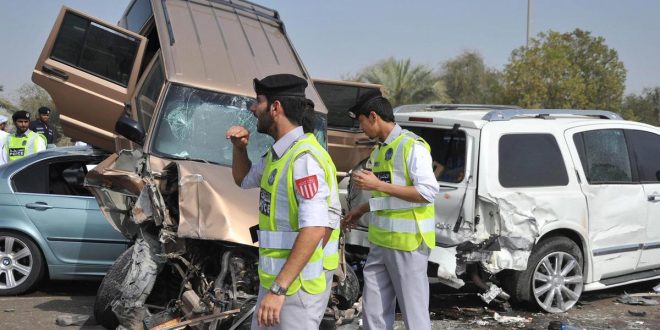A built-in car safety system that automatically alerts police in the event of a crash will be rolled out to prevent needless road deaths across the UAE.
On Monday, the Telecommunications Regulatory Authority said Fazaa, a local eCall system that reports an accident to the nearest police station within 10 seconds, will be mandatory for all vehicles driven in the UAE beginning 2021.
Manufacturers — including Mercedes-Benz — have already begun installing eCall, which is used in Europe, on vehicles headed for the Emirates.
As of April last year, all vehicles sold in the European Union were fitted with the device. It was introduced as a means to reduce the death rate on Europe’s roads – which average around 25,000 people a year.
It is hoped it will have the same effect in the UAE.
“The importance of this new system comes from the fact that it shortens response time to accidents and provides relevant authorities with the information necessary for rescue and ambulance operations,” said Mohamed Jadah, director of wireless networks and services at TRA.
By 2021, any car not fitted with Fazaa will not be approved for entry into the UAE by the Emirates Authority For Standardisation and Metrology. Officials said they would study the possibilities of fitting the system into existing cars but gave no further details.
The Fazaa system is triggered as soon as in-vehicle sensors detect a serious accident. A free emergency message is sent to police including the vehicle type, location, fuel type and number of passengers inside the vehicle. The system can also be activated manually with the push of a button.
Once the report is sent, police in the operations room establish a call through the system to speak to passengers for more information and to check if they are conscious.
Fazaa is expected to play “a central role in reducing the number of deaths and serious injuries,” Mr Jadah said.
Brig Gen Nasser Al Maskeri, head of Abu Dhabi Police Central Operations, said the system would be particularly helpful in cases of accidents caused in remote areas or when a motorist, driving alone, is injured and unable to call police themselves.
“It happens that, in late night hours on some internal streets away from the main road, when an accident occurs causing injuries, it could take time for someone to pass by and report it,” he said.
“It happened before that people were late to report accidents. It could take between one minute and an hour for someone to pass by and report the accident.”
Even in busy areas, he said, it could take an extra 30 seconds for anyone to call emergency services and “those 30 seconds make a difference.
“It is not about the location as much as it is about the instant reporting of a crash, and the device is capable of giving more accurate information about location and car situation than a human caller.”
During the mild winter weather, desert trips are common and could increase the probability if emergencies happening in off-road areas, said Brig Gen Al Maskari.
“As long as there is reception, the car will make the call, and all of the country’s deserts have network coverage.”
Police trialled the service Fazaa using simulated accidents.
In one test, a car carrying four crash test dummies was flipped over. A report was immediately sent to police detailing what had happened to the car, where the accident occurred and which of the passengers were wearing seat belts.
“Once the data was received, a communication call started between the car and the emergency centre,” said Ahmad Al Shamsi, acting director of technology development at TRA.
An operator was able to speak to the passengers to ask for more details about injuries to gauge the number of emergency teams needed.
A similar feature was released this year in co-operation with Dubai Police. AML (Advanced Machine Location) enables mobile phones to give police the same accurate information after a crash.
“But in the case of AML a passenger needs to dial 999 for the information to go through,” said Mr Al Shamsi, “whereas, in the case of Fazaa, the car makes the call.”
In July, there were also talks about making it mandatory for new drivers aged between 18 and 21 to install black box devices in their cars.
The in-vehicle data recorders would monitor the driver’s performance.
The National
 UAE BARQ برق الإمارات – نبضك
UAE BARQ برق الإمارات – نبضك


